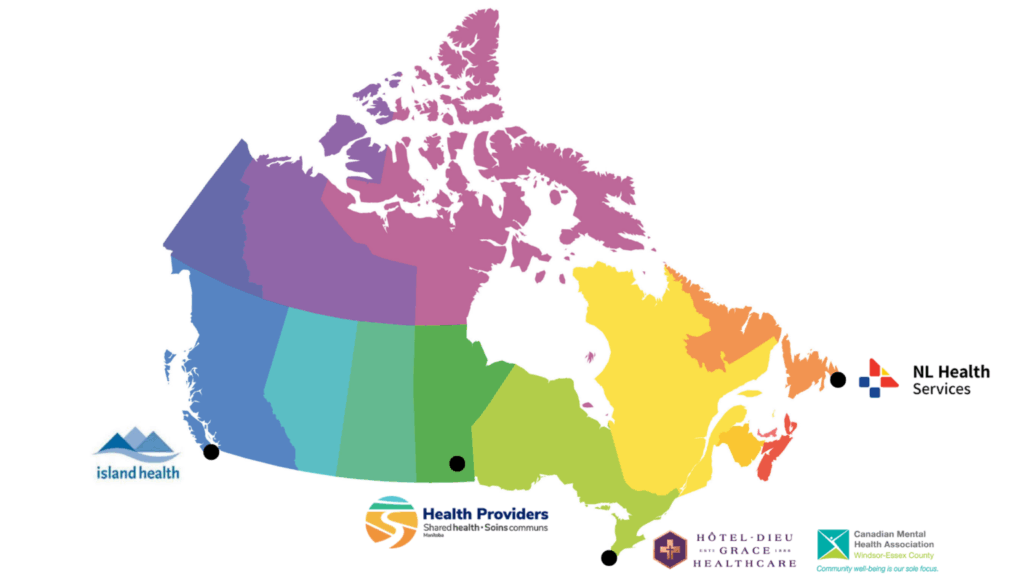Home › Schizophrenia Demonstration Project
Schizophrenia Quality Standards
Standardized, evidence-based care shouldn’t take decades to reach those who need it. Access Advancing Schizophrenia Care through the Schizophrenia Quality Standards – An Implementation Toolkit to strengthen outcomes and quality of life for adults living with schizophrenia, to see how quality standards can improve outcomes today.
Schizophrenia Quality Standards
Schizophrenia is a severe mental illness that is associated with premature mortality and high disease burden. While there is well-established evidence for the care of adults with schizophrenia, the reality is that schizophrenia care varies widely across Canada, and many adults living with this illness do not receive optimal care.
Quality standards synthesize the best available clinical evidence. They are intended to reduce variability and establish the minimum standard of care that each person is entitled to receive. It takes 14-17 years for clinical evidence regarding care to be implemented in routine clinical practice. Quality standards help close this gap.

National Demonstration Project
As part of a nationwide effort to advance schizophrenia care, the Mental Health Commission of Canada (MHCC) and Ontario Shores Centre for Mental Health Sciences (Ontario Shores) collaborated from April 2023 to May 2025 to support the implementation of Ontario Health’s Schizophrenia Quality Standards (Standards) at four demonstration health-care sites across Canada. The following health-care organizations participated as demonstration sites to implement the Standards:
- Adult Forensic Mental Health Services, Manitoba
- Hôtel-Dieu Grace Healthcare and Canadian Mental Health Association, Windsor Essex, Ontario
- Newfoundland and Labrador Health Services, Newfoundland and Labrador
- Seven Oaks Tertiary Mental Health Facility, British Columbia
The demonstration sites received information and guidance on all the quality statements in the Standards, with a focus on implementing statements on psychotherapies (cognitive behavioural therapy for psychosis and family intervention) and pharmacotherapies (treatment with clozapine and treatment with long-acting injectable antipsychotic medication). These four statements had a significant impact on schizophrenia care and patient outcomes. Successfully implementing them demanded considerable resources for education, training, and measurement, all of which the demonstration sites gained through their participation in this project.
The MHCC and Ontario Shores provided tools, education, training, and change management support to enable sites to implement the Standard(s). Each site benefited from a customized approach based on its specific organizational and regional needs. The work also served as a platform for the MHCC to develop a bilingual implementation Toolkit to support the national scale-up for other organizations interested in implementing the Standards.
Overview of the Schizophrenia Quality Standards National Demonstration Project Results
The project’s demonstration phase successfully concluded in May 2025, improving the care for 920 individuals across all sites. Over 33 patients and family members were consulted and actively engaged in sharing their personal stories and experiences with the project, with their powerful feedback highlighting the positive impact of the care they received. Results include:
- Patient symptom severity decreased by 69% and daily functioning improved by 68%.
- This initiative also transformed clinical practice: provider adoption of best-practice pharmacotherapy soared from 45% to 99%, and measurement-based care, vital for data-driven decisions, increased from 28% to 91% in the final months.
- As a direct result, sites have actively embedded measurement-based care into their clinical workflows and all have developed plans to sustain and spread their use of these Standards.
To learn more about the results and impacts, read the Schizophrenia Quality Standards National Demonstation Project Outcomes Report.
Get the latest updates delivered straight to your inbox.
Sign up to get updates
Schizophrenia Quality Standards


About Schizophrenia
Symptoms of active schizophrenia can include delusions, hallucinations, disorganized speech and/or behaviour, and impaired cognitive ability. The severity, duration, and frequency of these symptoms can cause social and occupational challenges. The Quality Standards are intended to ensure there is a minimum standard of care for adults living with schizophrenia in hospital and community settings in Canada.
Although there is no cure for schizophrenia, programs and treatments are available to help manage symptoms. Reducing public misunderstanding and the stigma associated with the disease can increase support for adults living with this illness.


About the Schizophrenia Quality Standards
The Standards were developed by Ontario Health and informed by guidance from the United Kingdom’s National Institute for Health and Care Excellence (NICE).
Adapted to the Canadian context and local conditions, the Schizophrenia Quality Standards include a series of 11 statements for Schizophrenia Care for Adults in Hospital, and, 15 statements for Schizophrenia Care in the Community. These statements are actionable, measurable, and grounded in the best available evidence.
The statements inform patients and families about what they should expect around medications and psychotherapies. This demonstration project focused on implementing the four core statements that have been shown to have the greatest impact on improving the quality of life and care for people living with schizophrenia: the statements on pharmacotherapies (treatment with clozapine and treatment with long-acting injectable antipsychotic medication) and psychotherapies (cognitive behavioural therapy for psychosis and family intervention).
Additional Resources
- Read our project outcomes report press release
- For more information on lessons learned throughout implementation, read our newsletter.
- Read our October 2024 Progress Report
- Find out more, read our Project Overview Report
- Read our project launch press release.
- If you are a person living with schizophrenia, a caregiver, a health-care provider, or someone affiliated with an organization that would like to learn more and/or to get involved with the project, please contact us at mha@mentalhealthcommission.ca.